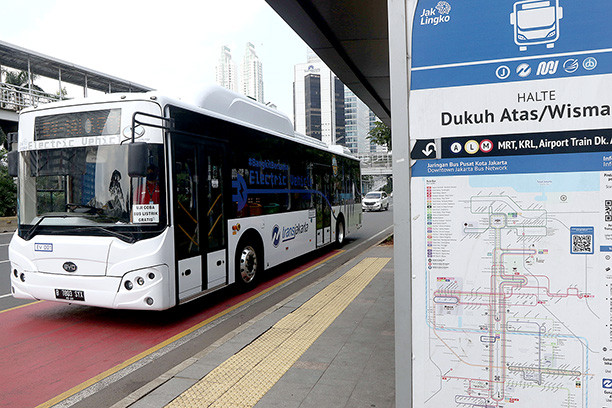Popular Reads
Top Results
Can't find what you're looking for?
View all search resultsPopular Reads
Top Results
Can't find what you're looking for?
View all search resultsTransjakarta wants 10,000 electric buses in service by 2030
City-owned bus operator Transjakarta has an ambitious plan to expand its electric bus fleet to 10,000 units over the decade as Jakarta, a city with one of the world’s worst air pollution, tries to push for cleaner air.
Change text size
Gift Premium Articles
to Anyone
 Extended service: An electric Transjakarta bus stops on Jl. Sudirman in Central Jakarta on Oct. 2. PT Transportasi Jakarta (Transjakarta) has extended the operating hours of the free electric bus to 8 a.m. to 8 p.m — from the original 10 a.m. to 8 p.m. – to serve more passengers during its three-month trial. (JP/Dhoni Setiawan)
Extended service: An electric Transjakarta bus stops on Jl. Sudirman in Central Jakarta on Oct. 2. PT Transportasi Jakarta (Transjakarta) has extended the operating hours of the free electric bus to 8 a.m. to 8 p.m — from the original 10 a.m. to 8 p.m. – to serve more passengers during its three-month trial. (JP/Dhoni Setiawan)
City-owned bus operator Transjakarta has an ambitious plan to expand its electric bus (e-bus) fleet to 10,000 units over the decade as Jakarta, a city with one of the world’s worst air pollution, tries to push for cleaner air.
Transjakarta’s facilities planning and standardization lead, Candra Rakhmat, said the company planned to kick off the expansion by adding 100 new electric buses in 2021, so that electric vehicles would comprise 3 percent of the total fleet.
“The [Jakarta] governor’s target is that, by 2025, at least 50 percent of all Transjakarta buses are electric, and by 2030, that figure reaches 100 percent,” he said at a webinar hosted by the Committee for the Phasing Out of Leaded Fuel (KPBB) and the International Council on Clean Transportation (ICCT) on Dec. 23.
The company’s presentation material shows more specifically that e-buses will contribute 83 percent of its fleet by 2030 or around 10,000 units. The remainder consists of the classic orange-colored diesel buses and blue-colored compressed natural gas (CNG) buses.
The expanding of Transjakarta’s e-bus fleet is aimed at implementing the international C40 Green and Healthy Streets Declaration that Jakarta, along with 33 other cities, signed in September 2019. Other promised programs to push for cleaner air include retiring old motor vehicles and expanding sidewalks.
The aim is to reduce Jakarta ‘s air pollution that causes 5.5 million cases of illness and costs Rp 6.8 trillion (US$ 482.2 million) in health expenses each year, according to Governor Anies Baswedan.
The Jakarta administration plans to acquire the e-buses through a Buy-the-Service (BTS) scheme, wherein operators finance the buses, which cost between 50 and 100 percent more than diesel buses, and then the city pays them back on a fixed rupiah-per-kilometer rate.
Candra said the city administration was still discussing the budget for the first 100 e-buses that, according to his presentation, are slated to serve Corridor 6 from Ragunan Zoo to Halimun and connecting bus lines 6A, 6B, 6D and 9D.
KPBB’s Ahmad “Puput” Safrudin said that, based on an internal study, Jakarta’s buses specifically contributed 13 percent of the city’s transportation pollution and 32 percent of its transportation greenhouse gas emissions.
“So if we replace the buses with electric ones, this figure will drop drastically,” he said.
Furthermore, city policy, as embodied by the Jakarta Cleaner Air program, assumes most of Jakarta’s pollution (46 percent) comes from motor vehicles. The remainder comes from factories (43 percent), power plants (9 percent) and households (2 percent).
Greater Jakarta Transportation Agency (BPTJ) head Aca Mulyana, also on Dec. 23, listed 11 electric buses in his jurisdiction: 10 under state-run bus operator Perum PPD and one under state-run bus operator PT Damri.
“We are pushing these transportation companies to switch from fuel to electricity, but it is difficult under these conditions,” he said, referring to the COVID-19 pandemic.
Transjakarta finished in October a three-month test for two electric buses running the Blok M – City Hall route. The operator had planned to roll out the 100 new buses this year but delayed the move to next year, blaming the pandemic.
“Because of COVID-19, we will relax the roadmap and focus the regional budget (APBD) on handling the pandemic,” said Jakarta Transportation Agency head Syafrin Liputo on Sept. 8 as reported by kompas.com.
Other than the coronavirus outbreak, common impediments to the introduction of electric buses include high upfront costs, limited charging infrastructure and the long lifespan of newer diesel buses, according to an International Finance Corporation report from January.
Similar reasons were behind Jakarta cancelling plans in 2015 to acquire new CNG buses even though Gubernatorial Regulation No. 141/2007 stipulates that all public transportation must use gas by 2014.
“This was a setback that contradicted gasification regulations,” said the KPBB’s Puput.
Your Opinion Matters
Share your experiences, suggestions, and any issues you've encountered on The Jakarta Post. We're here to listen.
Thank you
Thank you for sharing your thoughts. We appreciate your feedback.









